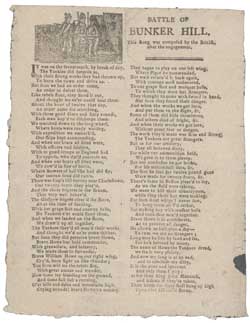Battle of Bunker Hill: This Song was composed by the British after the engagement
To order an image, navigate to the full
display and click "request this image"
on the blue toolbar.
-
Choose an alternate description of this item written for these projects:
- MHS 225th Anniversary
- Main description
[ This description is from the project: Coming of the American Revolution ]
This printed document contains the lyrics of a ballad published in England after the Battle of Bunker Hill. The ballad describes the movements of British troops to Long Wharf where they got into boats, rowed across the harbor to Charlestown where, after landing on the shore, they directly fought their enemy on the battlefield.
"the poor and ignorant"
Songs play an important role in the American Revolution. Ballads such as this one published in England serve several purposes: to rouse the troops, ridicule the enemy, and play on the emotions of the listeners in a way that only music can. General Howe, who commanded the assault on Bunker Hill is depicted here as "brave", "considerate", "beloved by many"; one whose very name "the Yankees dread". What American could command that same kind of allegiance and respect from soldiers and civilians alike?
Questions to Consider
1. For what audience is the song intended and what is its purpose?
2. How are the Yankees portrayed in this song? How are the British portrayed? Show specific examples of how this is done.
3. What is the meaning of this line: "There's some in Boston pleas'd to say,/As we the fields were taking,/We went kill their countrymen,/While they their hay were making/For such stout whigs I never saw,/To hang them all I'd rather,/For making hay with musket balls/And buck-shot mix'd together." What does the songwriter mean by implying that the Yankees were "making hay with musket balls"?
4. Why is John Hancock referred to as "King Hancock"? What is that "hill call'd Bacon"? What is its actual name and where is it located?
Further Exploration
5. QUESTION

